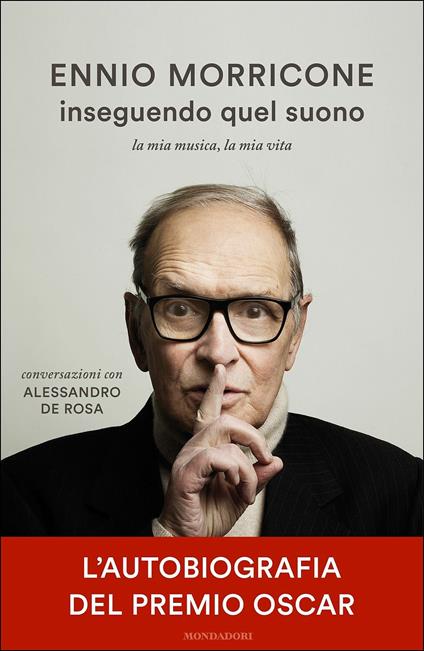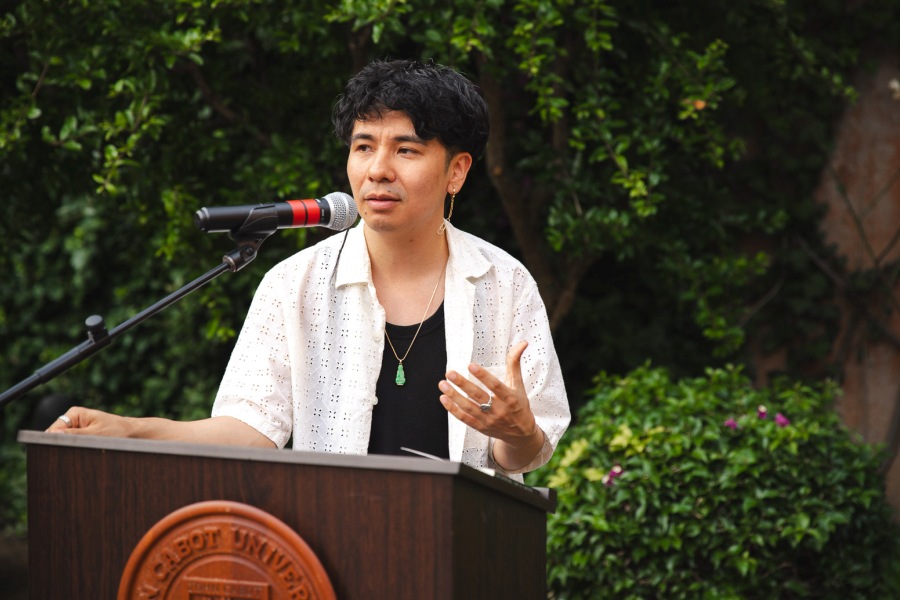JCU Presents "Chasing That Sound: An Ennio Morricone Story"
On March 30, 2023, JCU hosted the event “Chasing That Sound – An Ennio Morricone Story.” The event was sponsored by the Department of Modern Languages and Literature, the Department of Communications and Media Studies, and the Dean of Academic Affairs’ Office.
Chasing That Sound: An Ennio Morricone Story
Ennio Morricone (1928-2020) was an Italian composer who wrote music for pop artists, theater, television and most notably, films. In 2009 his score for the film The Good, The Bad and The Ugly (1966) was inducted into the Recording Academy Hall of Fame. In 2016, Morricone won an Academy Award for his score for The Hateful Eight (2015).
Musicians Claudio Farinone and Fausto Beccalossi have arranged many of Morricone’s pieces into music for guitar and accordion. During the event, the two musicians sat alongside Alessandro De Rosa, author of Morricone’s official biography. The three of them told the story of Morricone’s life through music and words, trading off between reading from his biography and playing many of the pieces that Morricone composed.
The theme throughout the performance was remembrance, to honor Morricone’s memories and celebrate them. De Rosa opened the presentation by acknowledging what Morricone wanted to be remembered for, or rather what he didn’t want. Although the composer wrote the score for more than 450 films, he never intended to be remembered for his work in cinema. “His legacy, his dream was to simply write music not linked to images, or art, as happens when writing music for film.” However, in 1961 when Sergio Leone asked Morricone to compose the score for his movie A Fistful of Dollars (1964), his iconic career in the film industry began.

Chasing That Sound book cover
While Morricone did not want to be remembered for his work in cinema, his ability to translate what was happening on screen and put it into music was one of his many talents. One of the emotions he captured so well, said De Rosa, was that of remembrance, and the feelings that come flooding back when you unlock a memory, good or bad. “How do you express the loss of dreams in music? Ennio Morricone’s answer was to write a melody that always repeats itself. Each repetition swells in accompaniments with density and orchestration. Like a memory that becomes stronger each time it comes back to us,” said De Rosa.
Morricone loved to tell the story of the movie within the music itself. De Rosa said, “The Maestro continually built bridges between musical and cultural worlds that usually do not communicate at all with each other.” In 1969 he wrote the score for the movie Love Circle (1969), a dramatic film directed by Giuseppe Patroni Griffi, about two men who are in love with the same woman. For this film, Morricone decided to have three distinct notes that the melody always falls back to, three notes for the three main characters. “The three characters are close but also distant and so are the intervals between the three notes, C, D, and E flat,” said De Rosa. As the relationship between the characters changes throughout the film, so does how those three notes are played.
Morricone spent his life experimenting with music. “I lived with curiosity throughout the 20th century,” he said. De Rosa pointed out that Morricone’s curiosity never died. At the end of the event, De Rosa read one final passage from Morricone’s autobiography: “How complicated it is to pursue a balance between the composer and the listener, always chasing that particular point of convergence. Always chasing that sound.”
The evening concluded with speakers and audience members singing “Here’s to You,” the 1971 song from the soundtrack of Sacco and Vanzetti (1971), a film about the two Italian anarchists who were sentenced to death by a U.S. court in the 1920s.
Watch the event: Inseguendo quel suono | John Cabot University, Rome – YouTube





